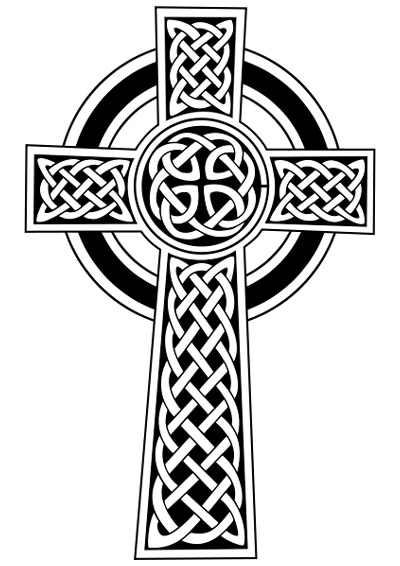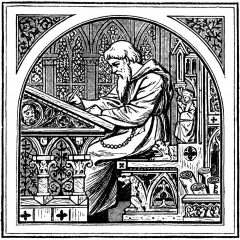
Bible reading 1 Timothy 4: 4-16
Christmas Eve for many is the day when we pack up work for the festive holiday and look forward to some time off – apart from the Clergy that is. It is also the day when certain people choose to do their last-minute Christmas shopping – married men in particular that is!!
Christmas Eve also marks the end of Celtic Advent or Lesser Lent, the period of 40 days beginning on 15th November which the Celtic Christians spent in spiritual preparation in order to celebrate the arrival of our Saviour on Christmas Day. The number 40 has great significance in our faith marking as it does the period of preparation before each new beginning or significant event, such as Jesus in the wilderness before the start of his ministry, the period of Lent before Easter and the period between the Resurrection and Ascension of our Lord.
David Cole in his book, 40 Days with the Celtic Saints[1] wrote that the Celtic Christians believed that there were three incarnations of Jesus. Firstly, the physical birth through Mary. Secondly, they believed Jesus is born within us spiritually each time we make our choice to walk in his ways rather than our own path. Lastly, Jesus returning at the end of the age to reconcile all things to God. This is reflected in our reading from 1 Timothy where Paul writes, “For every creature of God is good, and nothing is to be rejected, if it is to be received with thanksgiving. For it is sanctified through the word of God and prayer. If you instruct the brothers of these things, you will be a good servant of Christ Jesus, nourished in the words of the faith, and of good doctrine which you have followed.” The Celtic understanding was that everything is one, there is no separation between the physical and spiritual, the secular and the sacred. Our mind, body and soul along with the spirit are all parts of one whole person, and each person is part of one whole creation belonging to and loved by God.
The pre-Christian Celts blessed everything in creation and while some of their worship practices were initially considered pagan because of their reverence for trees, rivers, woodland, mountains etc it wasn’t the symbols of nature that they worshipped as such but the inspiration that lay behind their worship; that they all came from the Creator and these rituals were later adopted into Christian practices.
It was these practices that were taken by Celtic missionaries in the bringing of a Christianity based on a simple liturgy centred on the figure of Christ who the Creator sent into the world to show us a better way. The period of 40 days spiritual preparation symbolised the expectation of new beginning, yet today we live in a world where we exploit what the creator has given to us, where the hope for humanity symbolised by the baby lying in a manger of straw has now been replaced with a culture of greed and excess. Where the Christmas period as we now term it is seen as the most profitable time of the year for businesses represented by a different kind of 40 days preparation – or is 60 or 70 based on how early we see Christmas merchandise on supermarket shelves?
One of the marks of Celtic Christianity was not to destroy other cultures but to incorporate some of the local practices into Christian worship, proof that a new religion can never succeed unless it is able to embody the best of the culture to which it comes. Sadly, in today’s world we appear to have the reverse, with the new religion of neoliberal consumerism pervading all aspects of our lives and culture to the extent that we seem to forget the true meaning of what Christmas is supposed to mean.
In the final part of our reading from 1 Timothy, Paul urges that he be an example to those who believe; in word, in your way of life, in love, in spirit, in faith, and in purity. The Celtic Christian missionaries did their best to live up to these ideals when bringing their unique form of worship, more community-focused and an emphasis on creation and Christ-centred activity.
Yet despite the times we live in especially now, we can like the Celtic Christians come to see and believe that the three comings of Christ can influence us for the better if we choose to allow them to do so.
[1] Cole, David, 40 Days with the Celtic Saints (Abingdon: Oxford, Bible Reading Fellowship, 2017) p.12
